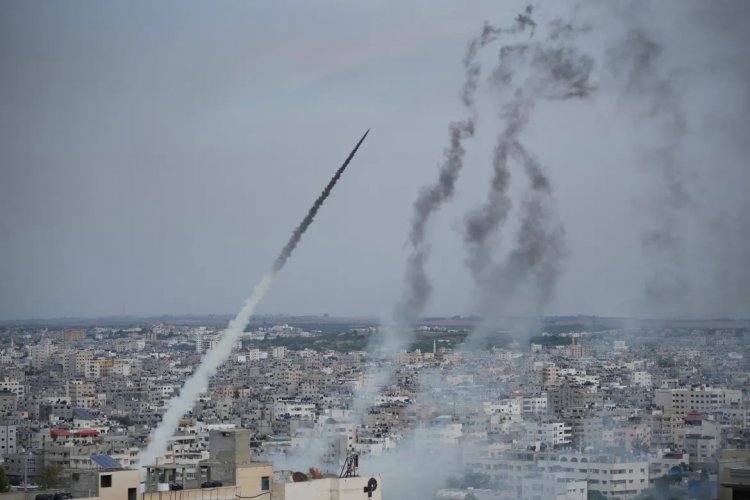Gaza War: India Shedding ‘Neutrality’ while Seeking to Maintain ‘Balance’
STORIES, ANALYSES, EXPERT VIEWS

India last week sent humanitarian aid to Palestine in addition to what is routinely routed through the United Nations Relief and Works Agency (UNRWA) in a move that is unlikely to go down well with the Modi government’s Right-wing ecosystem that is more inclined to the Zionist policies of Israel.
The relief includes nearly 6.5 tonnes of medical aid and 32 tonnes of disaster relief material for the people of Palestine.
India’s decision to send additional aid to Palestine came a day after the first convoy of humanitarian aid to the under-seige Gaza Strip was allowed in through the Rafah border with Egypt Saturday.
External Affairs Ministry spokesperson Bagchi said India has “been supporting Palestine and Palestinian refugees through significant contribution to the UN Relief and Works Agency, UNRWA. A total of $29.53 million has been contributed to the UNRWA between 2002 and 2023.
“The Indian annual contribution was actually increased from $1.25 million to $5 million in 2018. And we have pledged this annual contribution of $5 million for the next two years. If there are any further developments, we will share that with you. We are looking at the situation.”
India’s support for the Palestinian cause has been an integral part of the nation’s foreign policy through successive governments of all political hues and has continued even as New Delhi developed relations with Israel. In 1974, India became the first non-Arab state to recognise the Palestine Liberation Organisation (PLO) as the sole and legitimate representative of the Palestinian people.
In 1988, India became one of the first countries to recognise the Palestinian State. In 1996, India opened its Representative Office in Gaza, which was later shifted to Ramallah on the West Bank in 2003.
Shifting concern and the ‘balancing’ act
The pro-Palestine stance had origins to India’s Muslim minority. The fear of triggering adverse Muslim reaction has, writes Swapan Dasgupta (Member of the Rajya Sabha; formerly has held editorial posts at Statesman, Daily Telegraph, The Times of India, Indian Express and India Today) “often deterred Indian governments from moulding its foreign policy in West Asia to national self-interest.”
After 2014, the BJP modified this policy. “There is a ‘special relationship’ that has come to define the India-Israel connect in the Modi era. What began as a softly-softly cooperation in irrigation techniques and agriculture has steadily progressed into the purchase of weaponry, surveillance systems and the sharing of intelligence. If this process is uninterrupted, we are likely to see a greater involvement between the software and technology sectors in southern India and the hi-tech hub of Tel Aviv.”
What is interesting is that the growing proximity between India and Israel, “has not marred South Block’s ties with the Arab world…..”
Policy towards Israel rooted in realpolitik
In the view of Bhopinder Singh (former Lieutenant Governor of The Andaman and Nicobar Islands and Pondicherry, former Army officer; was the former military secretary to president K. R. Narayanan and to President A. P. J. Abdul Kalam) “India’s dichotomous stand on Israel wasn’t just idealism, but rooted as much in realpolitik. With its energy needs from West Asia at stake, sizeable foreign exchange remittances from the Indian diaspora, and also over 50 invaluable votes in forums like the United Nations -- officially not recognising Israel due to ‘morality’ had some solid practicalities, that remained unstated. It was an arrangement which worked well as Israel was content to work in the shadows, as that also meant it knowingly compromised its own equation with Washington, which was a firm Pakistan ally in 1965, 1971 or even 1982 when the Kahuta operation was murmured.”
Israel was always understanding of India’s constraints: Significantly, Singh recalls “Israel was always extra-understanding. Jawaharlal Nehru had indulged in grandstanding on Palestine, but had also reached out to Israeli Prime Minister David Ben-Gurion after the 1962 China tensions…..
“During the Kargil War, when India still faced some technology sanctions, Israel had ignored international concerns and expedited supplies of mortar ammunition, laser-guided missiles, Heron and Searcher UAVs, etc. Since then, India has become Israel’s biggest and most dependable purchaser of weapons, besides a ‘strategic partner' and co-producer of weaponry.”
Shedding ‘neutrality’: However, all along, “India hadn’t diluted support for a ‘two-state solution’, that envisages a sovereign state of Palestine…..” But the recent attack by Hamas on Israel “led to the unprecedented shedding of ostensible ‘neutrality’ by New Delhi…..”
















